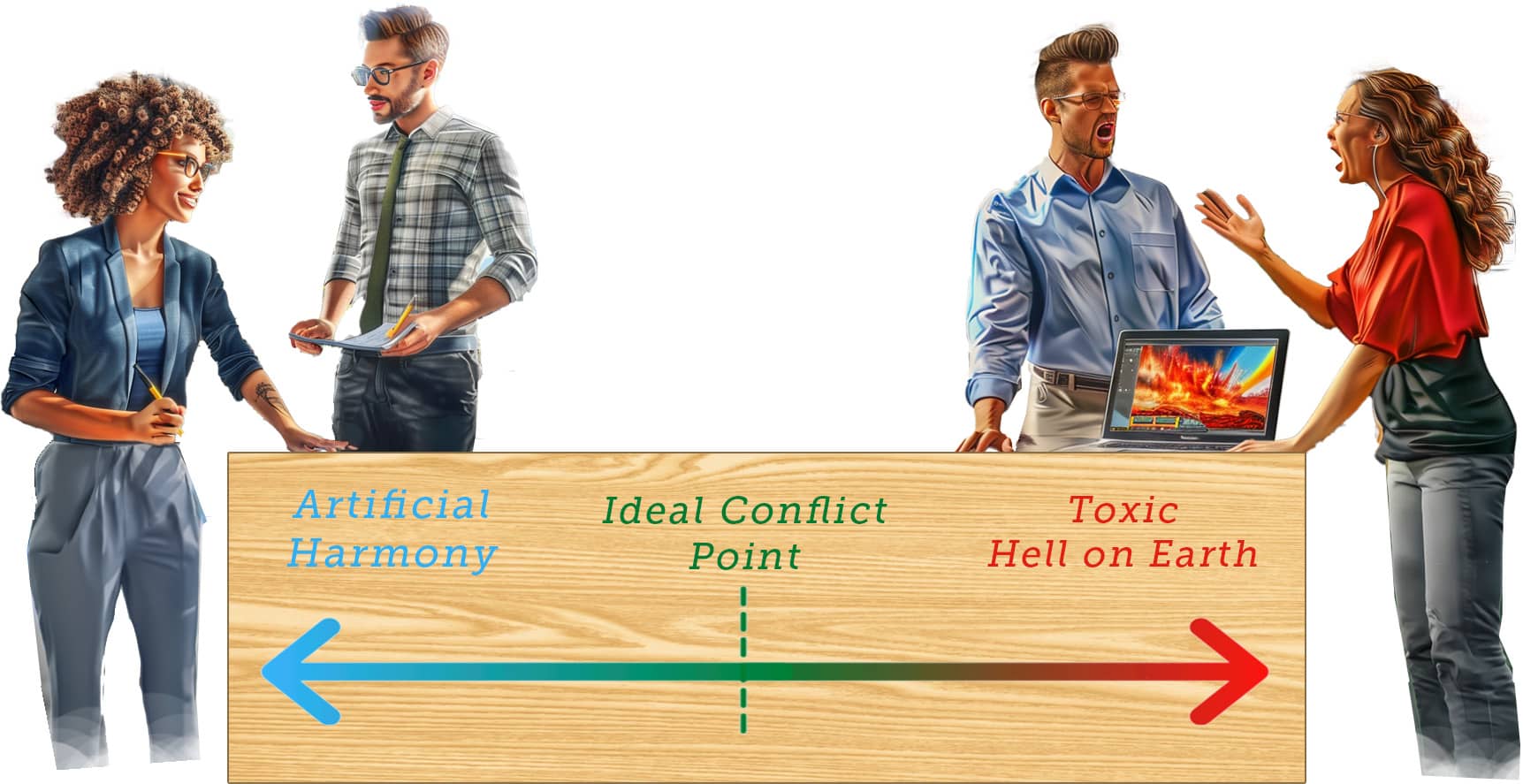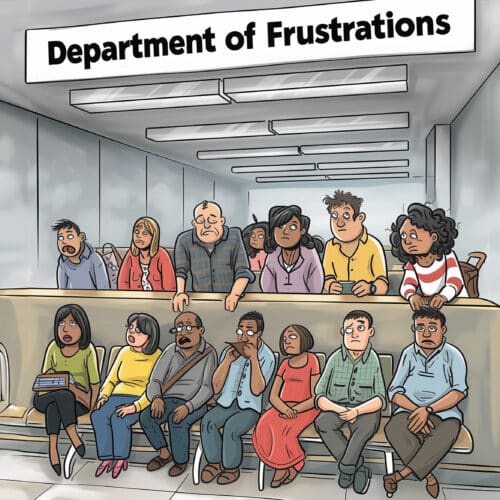“The ideal team player embodies humility, hunger, and people smarts.”
– Patrick Lencioni
Healthy conflict in the workplace is a critical aspect of a productive and harmonious team environment. Patrick Lencioni’s The Five Dysfunctions of a Team brings to light the significance of embracing conflict as a means to achieve collective success. Here I explore the concept of healthy conflict and how the key leadership traits of being Hungry, Humble, and Smart (from Patrick Lencioni’s The Ideal Team Player) contribute to fostering this environment.
The Essence of Healthy Conflict
Healthy conflict involves constructive ideological debate that focuses on ideas and strategies rather than personal disagreements. It’s a vital element for innovation, problem-solving, and preventing groupthink. Kenneth W. Thomas and Ralph H. Kilmann, recognized for their conflict mode instrument, emphasize that healthy conflict is a blend of assertiveness and cooperation, allowing for diverse perspectives to be expressed and considered.
Hungry, Humble, and Smart Traits in Healthy Conflict
 In Patrick Lencioni’s influential work, The Ideal Team Player, he articulates a clear and transformative framework for understanding the essential virtues of a team member who contributes profoundly to the overall success of an organization. These virtues are Hungry, Humble, and Smart. Lencioni posits that it’s not just individual skills or experiences that make a team player invaluable, but rather a blend of these three critical attributes. Lencioni emphasizes that the synergy of these qualities cultivates a collaborative, effective, and adaptable team environment, essential for achieving and maintaining high performance in any organization.
In Patrick Lencioni’s influential work, The Ideal Team Player, he articulates a clear and transformative framework for understanding the essential virtues of a team member who contributes profoundly to the overall success of an organization. These virtues are Hungry, Humble, and Smart. Lencioni posits that it’s not just individual skills or experiences that make a team player invaluable, but rather a blend of these three critical attributes. Lencioni emphasizes that the synergy of these qualities cultivates a collaborative, effective, and adaptable team environment, essential for achieving and maintaining high performance in any organization.
Transform team dynamics with our Workshops on The Five Dysfunctions of a Team.
Understand how Hungry, Humble, and Smart attributes contribute to team success.
The three qualities of the Ideal Team Player who inevitably seeks to participate in healthy conflict are:
- Humble: A Humble team player is self-aware and puts the collective needs of the team above their own ego. This trait involves prioritizing the team’s success over personal agendas. It means recognizing that individual success is tied to the team’s achievements, and engaging in conflict is a means to contribute to collective goals.
- Hungry: The Hungry aspect refers to the inner drive and determination to work hard, take on responsibilities, and go the extra mile for the team’s success. Hunger, or ‘Fire in the Belly’, is characterized by strong ambition and a relentless drive for the team’s success. It drives individuals to pursue the best ideas and strategies, pushing the team toward excellence.
- Smart: Smart relates to emotional intelligence, the ability to understand and interact effectively with others, and navigate interpersonal dynamics with acumen. Emotional intelligence, or being Smart, is crucial in managing conflicts. It involves understanding diverse personalities and belief systems, facilitating productive and respectful discussions.
Characteristics and Examples of Healthy vs. Toxic Conflict
 Healthy conflict is marked by a focus on issues, mutual respect, open communication, constructive criticism, and a commitment to resolution. For instance, in idea generation sessions or project debriefs, team members might challenge each other’s ideas but remain respectful and focused on finding the best solutions.
Healthy conflict is marked by a focus on issues, mutual respect, open communication, constructive criticism, and a commitment to resolution. For instance, in idea generation sessions or project debriefs, team members might challenge each other’s ideas but remain respectful and focused on finding the best solutions.
In contrast, toxic conflict involves personal attacks, a win-lose mentality, lack of listening, and escalation, leading to a hostile work environment. Examples include the blame game in meetings or silencing others’ opinions, which stifles participation and breeds resentment.
Harmony through conflict? Yes, it’s possible.
Learn how PointerWise can guide your team to productive debates & strong bonds.
Leading Healthy Ideological Debate
Here are a few basic tips for leading healthy conflict on your team, even if you’re not the one with the title at the head of the table:
- Encourage Openness: Foster an environment where team members feel safe to express their ideas.
- Set Ground Rules: Establish guidelines for debates to focus on ideas, not personalities.
- Lead by Example: Demonstrate humility, ambition, and emotional intelligence.
- Foster Mutual Respect: Promote active listening and respect for different viewpoints.
- Focus on Objectives: Align discussions with team goals.
Lencioni’s Conflict Continuum
 This continuum illustrates the spectrum of conflict. Draw a straight line on a piece of paper and label the far left “Artificial Harmony“ and the far right “Toxic Hell On Earth.” This is how many of us view conflict based on how we were socialized to approach conflict in our childhoods. Some of grew up where conflict wasn’t allowed and our parents or others we looked up to approached it by being dishonest in face-to-face interactions and then undermining others surreptitiously to accomplish goals. Others grew up with open or even violent conflict that was so toxic and painful that we never want anything to do with conflict and find even a hint of it triggering. The ideal state is the middle ground, where ideological debates are respectful and constructive, and we have not tipped the scales to making it personal. Most teams, however, live closer to artificial harmony, avoiding direct and open debate, pretending we agree, and then communicating our criticisms or actual ideas in ways that are far less efficient and sometimes destructive of trust. We may feel that one step toward healthy debate is actually a step toward “Toxic Hell On Earth.” But this just isn’t true. Just as letting go of unhealthy personal attacks is not a step toward weakness and artificial harmony.
This continuum illustrates the spectrum of conflict. Draw a straight line on a piece of paper and label the far left “Artificial Harmony“ and the far right “Toxic Hell On Earth.” This is how many of us view conflict based on how we were socialized to approach conflict in our childhoods. Some of grew up where conflict wasn’t allowed and our parents or others we looked up to approached it by being dishonest in face-to-face interactions and then undermining others surreptitiously to accomplish goals. Others grew up with open or even violent conflict that was so toxic and painful that we never want anything to do with conflict and find even a hint of it triggering. The ideal state is the middle ground, where ideological debates are respectful and constructive, and we have not tipped the scales to making it personal. Most teams, however, live closer to artificial harmony, avoiding direct and open debate, pretending we agree, and then communicating our criticisms or actual ideas in ways that are far less efficient and sometimes destructive of trust. We may feel that one step toward healthy debate is actually a step toward “Toxic Hell On Earth.” But this just isn’t true. Just as letting go of unhealthy personal attacks is not a step toward weakness and artificial harmony.
Strategies for Fostering Healthy Conflict
 To cultivate healthy conflict, it’s important that team members learn the concepts of being Hungry, Humble, and Smart and how those traits play out for them and for the team in the context of disagreement. It often helps to have team members stack rank which of the Ideal Team Player traits come easiest to hardest for them, so that they can openly admit where they need help and thus begin the process of building trust sufficient to enable good conflict.
To cultivate healthy conflict, it’s important that team members learn the concepts of being Hungry, Humble, and Smart and how those traits play out for them and for the team in the context of disagreement. It often helps to have team members stack rank which of the Ideal Team Player traits come easiest to hardest for them, so that they can openly admit where they need help and thus begin the process of building trust sufficient to enable good conflict.
Embracing healthy conflict in the workplace can transform a team’s performance and cohesion. By nurturing Hungry, Humble, and Smart traits, leaders can guide their teams towards a balanced and productive conflict environment, where open and constructive debates propel the team towards the very best and innovative ideas, as well as collective and individual success.
“True humility is not thinking less of yourself; it is thinking of yourself less.”
– C.S. Lewis
Become the leader your team deserves.
Our expert Coaching Programs guide you in fostering healthy workplace conflict.
Start your journey today!






